Insects at Reiman means 'oohs,' not 'ewws'
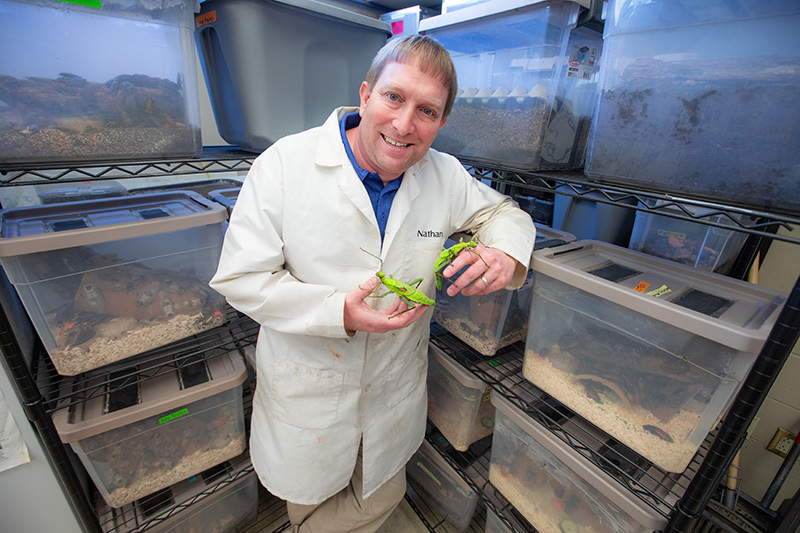
Reiman Gardens director of entomology Nathan Brockman holds a pair of female jungle nymphs next to other cases containing insects that will rotate through the new display cases in the lobby. Photos by Christopher Gannon.
It started with butterflies, but over the years Nathan Brockman grew Reiman Gardens' insect population, introducing some who move a little slower and others who spin a web.
"When Reiman first started, the emphasis was definitely on butterflies -- primarily only on butterflies -- and there was a push not to have any other invertebrates," said the gardens' director of entomology. "Over the years, I have added to the collection, with most of it coming from other institutions that had more than they could handle.
"Butterflies are a great gateway insect into the invertebrate world because they are something people don't even consider insects."
Enter the main doors of Reiman Gardens and just right of the information desk are insect display cases and some viewing windows where a group of walking sticks were hanging out one day in late February. Tucked away in a small room are more than 30 species of insects that include beetles, millipedes, isopods and tarantulas. Brockman's hope is that people who come for the butterflies take time to learn about other insects.
Learning is power
Brockman said the addition of insects to Reiman Gardens is a way to teach visitors about the many useful things they do while lessening fear of six-legged movers.
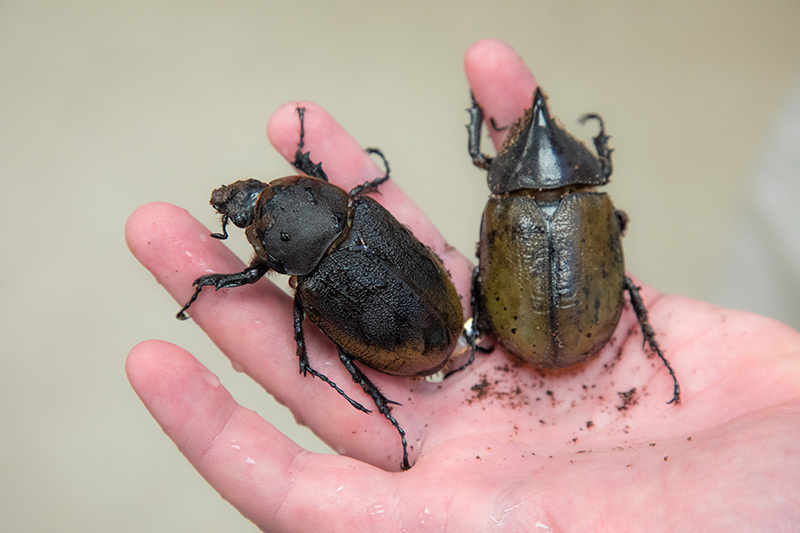
Reiman Gardens director of entomology Nathan Brockman holds a female, left, and male Hercules beetle inside the entomology lab.
"We have a lot of biology-based clubs that visit the lab and engage with the insects we have here," he said.
Brockman enjoys seeing children interact with the insects but gets more excited when that interest continues with high school and college visitors who are considering a major in entomology or related field. Ames High School takes advantage with its advanced biology class and the "Behind the Scenes" tour where students handle and interact with a variety of insects.
"We've had parents arrange a tour (during their campus tour) to give their students who may be interested in entomology an experience with invertebrates," Brockman said. "I enjoy sharing my passion with them, and it might lead them to pursue something in the field."
Collaboration
Brockman supervises students who work in the lab and in the butterfly wing. Graduate students and faculty conduct research, of which a recent project focused on butterfly flight. A makeshift wind tunnel was constructed in the lab.
Reiman Gardens also has a multidiscipline internship program that allows students to work in a variety of areas, including the insect lab. Strategic plan funds for fiscal year 2024 are ensuring internships remain available while Reiman Gardens recovers from the pandemic, including a summer internship dedicated to entomology.
"That funding has allowed us to keep the intern program at 10 students -- instead of having to significantly cut the number -- and they have rotations where they can intern in different departments to understand all aspects of public garden operations, including entomology," said Reiman Gardens director Ed Lyon. "Our interns also get the opportunity to go on two local and one overnight tour related to public gardens, the green industry or education. This helps broaden their horizons beyond the gardens themselves."
Brockman assists the Insect Zoo, based in the plant pathology, entomology and microbiology department, as needed. That outreach program also is important to him because he was one of the first students to work with it as an undergraduate.
"We also partner with the entomology department for a variety of things like Pollinator Fest in June and the Day of Insects in March," Brockman said. "Being the university's public garden allows us to have discussions about pollinators, which is more than just honeybees. The number of flies, beetles and butterflies that are doing pollinating work is important."
New student opportunities
Reiman Gardens currently has a collection of custom-duty seizure tarantulas.
"We are one of the few facilities in the nation that will take insects that are illegally smuggled into the country," Brockman said. "When smuggline happens, the U.S. Fish and Wildlife Service can either destroy them all or find them a home that keeps them out of the pet trade."
To expose more veterinary students to invertebrate care, Brockman worked with veterinary clinical sciences clinical assistant professor June Olds. Students in the "Wildlife Medicine" and "Exotic Pet Medicine" courses took home 33 tarantulas in February to care for them. Brockman hopes it will lead to more students feeling comfortable enough to treat invertebrates -- a specialty in short supply around the nation.
"It allowed them to observe and care for the tarantulas, and they are able to share their experiences with us," he said. "Hopefully, this is something we can do in future years."
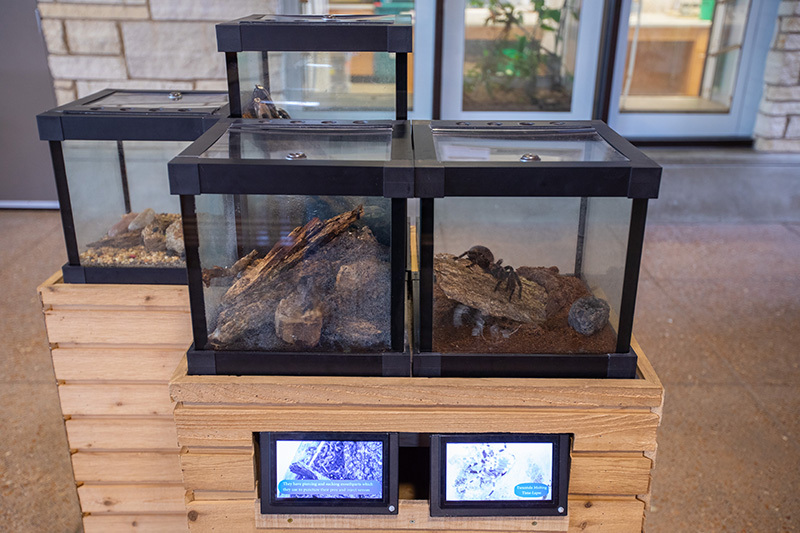
The new insect display cases in the Reiman Gardens lobby.
Admitted students will visit campus Friday
The admissions team, undergraduate colleges and student service units are hosting their third spring Admitted Student Day on Friday, March 29 (9 a.m.-4:30 p.m.) for more than 2,000 visitors. The group features students who have been offered admission to Iowa State, some of whom have accepted their offer. Many of them are visiting campus with family members for the first time -- or again -- to decide if Iowa State will be their school.
"A majority of our students will be first-time visitors, which makes help with navigation and wayfinding so impactful," said Brylee Groskreutz, campus visits coordinator in the office of admissions. "We also have many students who are using this experience as a follow-up visit to help make their college decision.
"We want to thank our entire campus community in advance for keeping an eye out for campus visitors Friday and going above and beyond to welcome them to campus."
An Iowa State experience
Admitted Student Day
9 a.m. Welcome, Stephens Auditorium
9:30-11 a.m., College open houses and resource fairs, various locations
11 a.m.-3 p.m., Breakout sessions, various locations:
- 11-11:45 a.m.
- 12:05-12:50 p.m.
- 1:10-1:55 p.m.
- 2:15-3 p.m.
Admitted Student Day begins at Stephens Auditorium, Iowa State Center, with check-in and a 9 a.m. welcome. All prospective students have a personalized schedule they selected prior to their visit. Beginning at 9:30 a.m., colleges and student services offices will host open houses at locations around campus. A series of 45-minute breakout information sessions start at 11 a.m. and continue every 65 minutes until 3 p.m. These sessions will provide insight to specific programs and majors, for example aerospace engineering or athletic training, city planning or financial counseling.
Campus walking tours, residence hall open houses and drop-in opportunities at student financial aid, Honors program, study abroad and other offices also will be offered throughout the day.
A few notes:
- A signing day table will be set up in the ISU Book Store (9:30 a.m.-4:30 p.m.) for admitted students who'd like to sign their "certificate of intent" to enroll at Iowa State.
- All visitors will receive complimentary ISU Dining tickets for lunch and may use them between 11 a.m. and 2 p.m. at Seasons Marketplace in the Maple Willow Larch commons, Union Drive Marketplace, Friley Windows or the Memorial Union food court.
- CIT maroon shuttle buses for visiting families will run all day from Stephens Auditorium to the Memorial Union west driveway. Visitors also are encouraged to use the CyRide orange route or walk to navigate central campus.
- Visitors are encouraged to stop by the Soults Family Visitor Center, Memorial Union ground floor, with any last questions before they depart campus. Students who signed their certificate of intent or previously accepted their admission offer can register for new student orientation in June.
Deans reappointed in Agriculture, Design and Engineering colleges
Deans Daniel Robison, Luis Rico-Gutierrez and Sam Easterling have been appointed to new five-year terms to lead the College of Agriculture and Life Sciences (CALS), College of Design and College of Engineering, respectively.
"Iowa State University has a strong set of deans who work together to enhance the breadth and quality of our academic programs, serve as catalysts for innovation and entrepreneurship, and support the state's economic and workforce goals," said senior vice president and provost Jonathan Wickert. "These reappointments are well-deserved, and I look forward to continued success in the coming years."
Daniel Robison
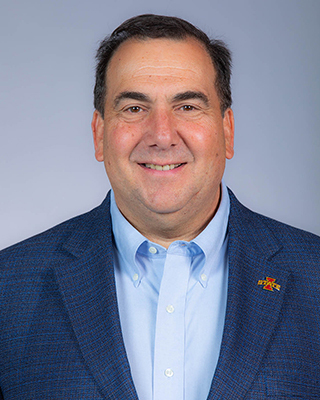
Robison
Robison, who was appointed CALS dean initially in 2018, stabilized enrollment, expanded external research funding and private fundraising, grew global programs and Extension and Outreach, and created opportunities through programs such as CALS Start Something, Study USA, Pathways and the Innovation and Entrepreneurship Faculty Fellows during his first term.
His reappointment is effective March 31.
Luis Rico-Gutierrez
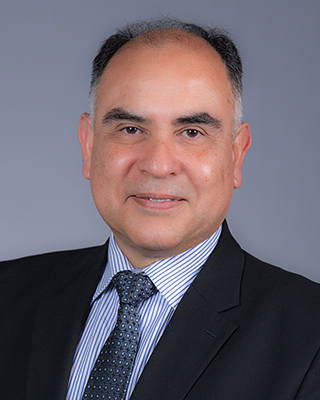
Rico-Gutierrez
In his third term, Rico-Gutierrez collaborated with faculty, staff and administrators to advance the College of Design strategic plan, nurture enrollment growth, support professional development and strengthen alumni relationships, resulting in successful program re-accreditations and fundraising success.
His reappointment is effective July 1.
Sam Easterling
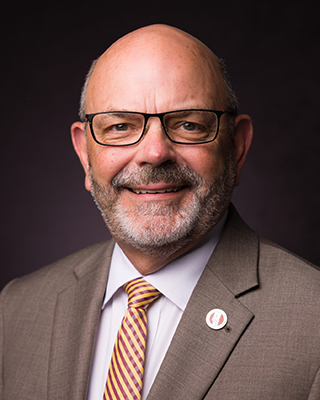
Easterling
Easterling, appointed in 2019 as the James L. and Katherine S. Melsa Dean of Engineering, stabilized undergraduate enrollment, created new degree programs, hired 60 new faculty, raised nearly $150 million in private and corporate donations, and secured record research funding in his first term.
His reappointment is effective July 14.
The three deans also guided their colleges through the COVID pandemic.
Wickert expressed his thanks to each college's Committee to Review the Dean for managing the comprehensive review process, as well as to faculty and staff who provided feedback. The committee members in each college were:
College of Agriculture and Life Sciences
- Scott Smalley (chair), agriculture education and studies
- Claire Andreasen, veterinary pathology, College of Veterinary Medicine
- Barb Clawson, horticulture
- Elisabeth Lonergan, animal science
- James Wright, agricultural and biosystems engineering
College of Design
- Lisa Fontaine (chair), graphic design
- James Brown, finance, Ivy College of Business
- Lieb Chol, Design information technology
- Jennifer Drinkwater, art and visual culture
- Julie Irish, interior design
- Jacob Martin, industrial design
- Michael Martin, landscape architecture
- Kimberly Moss, art and visual culture
- Mitchell Squire, architecture
College of Engineering
- Julie Rursch (chair), electrical and computer engineering
- Tim Bigelow, electrical and computer engineering
- Caroline Hayes, mechanical engineering
- Duane Johnson, materials science and engineering
- Carolyn Lawrence-Dill, College of Agriculture and Life Sciences administration
- Daniel Wendl, College of Engineering Advisory Board
Sirna named to equal opportunity post
Mary Howell Sirna has been named director of equal opportunity and Title IX coordinator following a national search. Her appointment began March 25 and is pending approval by the state Board of Regents.
Sirna had been serving as interim director since July. She worked in the same capacity from October 2015 to April 2016 and again from October 2021 to May 2022.
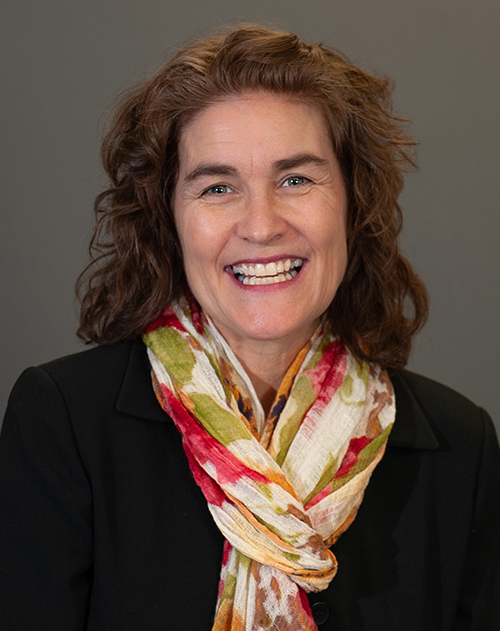
Mary Howell Sirna
"Mary has an excellent set of credentials and has demonstrated success as interim director on three occasions," President Wendy Wintersteen said. "I am delighted she will permanently lead this office to support our efforts ensuring all students, faculty and staff have access and opportunity to work hard and succeed."
Reporting to the president's office, Sirna will oversee the office of equal opportunity responsible for supporting equal access to employment and educational opportunities, including investigating complaints of discrimination and sexual misconduct and ensuring compliance with federal Title IX, Title VI, Title VII and the Americans with Disabilities Act.
"I am honored for the opportunity to serve in this role, and I want to thank President Wintersteen for entrusting me with this responsibility," Sirna said. "I look forward to continued collaboration, transparency and communication with the Iowa State community to ensure students, staff and faculty have an equal opportunity to learn and work free from discrimination, harassment and sexual misconduct, consistent with the university's values and Principles of Community."
Because of its compliance function, this position is not subject to the yearlong hiring freeze for diversity, equity and inclusion (DEI) positions at the three regent universities required as part of the state's FY 2024 higher education appropriation. Nor is it part of the current review of positions and programming required by the regents' 10 DEI directives.
Since 2013, Sirna has served as the administrative advisor and attorney on staff for ISU police. She is a member of the investigative and threat assessment teams and manages the Story County Sexual Assault Team, for which Iowa State is a partner agency. Prior to that, she served as first assistant county attorney in the Story County attorney's office.
Sirna holds bachelor's degrees in political science and theater arts from Mount Holyoke College, South Hadley, Massachusetts; and a J.D. from the University of Iowa.
Student engineers solve industry problems and deliver economic value
Editor's note: This feature is the second in news service's 2024 Innovation at Work series of stories, photos and videos that highlight economic development and the impact of Iowa State's contributions across the state. A new entry will post every Tuesday through April 23.
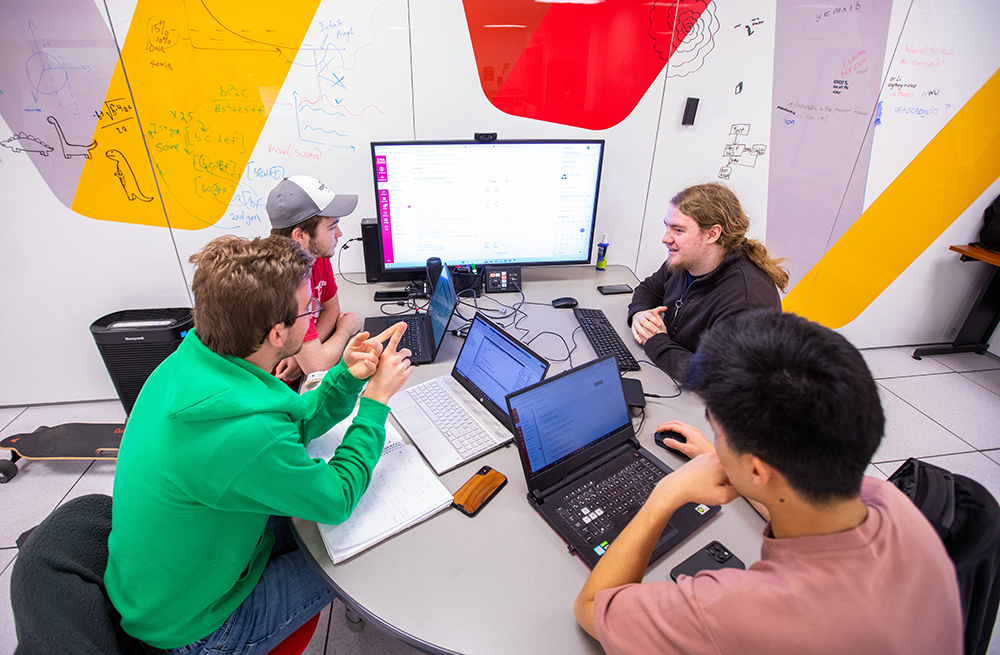
Mechanical engineering students huddle in "The Mine" in the basement of the Black Engineering Building while working on their capstone project. Counter-clockwise from left are students Nick Felbinger, Jacob Fosse, Wee Sean Koh and Isaac Bibus. Distinguished Professor of Practice Jim Heise teaches the course. Photo by Christopher Gannon.
To get a vintage trolley to stop, an operator grabs the handle of part SA-26, an independent brake valve, and pushes to the right. Compressed air runs through the system and forces brake shoes against the wheels to slow and stop the trolley.
To get going again, the operator, no doubt dressed in throwback hat and uniform, releases the brakes with a pull to the left and a rush of vented air.
That brake valve is an essential part if you want to restore a trolley or build an authentic replica. But what do you do if you're the Gomaco Trolley Co. in Ida Grove, and that valve is no longer on the market?
If you're Lex Jacobson, a 1998 Iowa State mechanical engineering graduate and the manager of the trolley company, you contact Iowa State's capstone course in mechanical engineering. That gets two teams of senior student-engineers doing some reverse-engineering.
Video story
Innovation for Business, featuring the Gomaco Trolley Co.
You'll ask them to take SA-26 apart -- there are 46 diagramed parts and pieces that are no longer protected by patents -- and figure out how the pieces can be manufactured and assembled.
Nine students worked on the problem during a recent class session, one team working on the cast-iron casing, the other working on the pins and springs of the inner workings. It turned out to be more of a challenge than they expected.
The scanning laboratory gave them a good start on producing proper 3D engineering drawings. But it didn't answer all the questions: "What sizes are the parts? What are they made of? What are the angles? What are our manufacturing recommendations?" said Nell Jaskowiak, a student from St. Louis.
Just as important as working out the engineering specifications, said Tyler Hentzel, a student from Ankeny, "is understanding what our sponsor wants."
Making a pitch for student teams
Jim Heise, a Distinguished Professor of Practice and one of the instructors of ME 415, "Mechanical Systems Design," said 214 seniors are working in 38 teams this spring semester. And he would love to have more projects for the students to manage, engineer and design.
Since the class started in 2008, students have completed 354 projects for 144 Iowa manufacturers. The companies pay a sponsorship fee (now $5,000 for Iowa companies and $8,000 for out-of-staters) to support the course and its expenses.
"The beauty of the program is you get two teams of students, with four or five to a team, all focused on one problem," Heise said. "You get two parallel paths of ideas."
But wouldn't assigning the project to an intern be as useful?
Heise shakes his head: "The capstone course gets more students working on a problem than an internship would, at the same cost."
Who could use a capstone team
Mayra Stephanie Ramirez, a workforce engagement specialist who works with capstone courses for Iowa State's Center for Industrial Research and Service (CIRAS), shares a one-pager to help companies identify potential capstone projects. It lists four phrases that could indicate a company's need for one:
- "I wish I had the time to ..."
- "It's not that difficult, it's just not a priority."
- "It's on the back burner."
- "That's on my engineer's 'to-do' list."
Capstone projects are important, Ramirez's document says, because they "can be a hiring conduit for companies to identify potential students for future hiring." And course projects "help create millions of dollars in economic impact and dozens of jobs per year."
Big numbers compiled by CIRAS quantify the breadth, scope and value of Iowa State's capstone courses: Students across the university have completed more than 1,280 capstone projects for more than 440 businesses and delivered an economic impact of more than $447 million.
Engineering for the bottom line
Dave Sly -- a teaching professor in industrial and manufacturing systems engineering who teaches industrial engineering's capstone course, IE 441, "Industrial Engineering Design" -- said his students make about seven trips to the companies they work with.
The students collect data on their field trips. They work with employees. They learn about machines. They observe processes. And they do all they can to find solutions and savings. Those could include improvements to assembly lines, productivity or quality control.
"As industrial engineers, we're very focused on the bottom line, the financial returns," Sly said. "We're not really creating products; we're making products more efficiently."
So much so, the course has a goal of creating $100,000 in net value over three years for each project. The actual returns can be in the millions. Sly said last fall's course included nine projects with a total economic impact of just more than $8 million.
One student team, for example, determined overtime shifts wouldn't be enough to meet production demands for an Ames manufacturer and recommended adding assembly lines instead. The change would ultimately create a gain in net present value of more than $25 million over five years.
That's a big return on investment for the company. There's a big return for the students, too.
When their capstone projects are complete, Sly said, "Our students can engineer, and they can communicate, and they can deliver economic value. Those are important attributes we're producing here at Iowa State."
Putting student projects to work
Lex Jacobson of the Gomaco Trolley Co. had good reasons to turn to Iowa State capstone students for help reverse-engineering the brake valve the company often uses in its manufacturing and restoration work.
First, the students have access to laboratory tools (such as a 3D scanning lab) that the company doesn't have. Second, it can be a great learning exercise for students to take an existing part and figure out how it works and how to build it. And third, the company doesn't always have the time or staff to get to these kinds of projects.
So, Jacobson turned to students. After the two capstone teams working on the brake valve made their midterm presentations, "I thought they were doing well," Jacobson said. "I felt like they had a pretty good approach to the project."
The students said the project has been a learning process. "It's not just cut and paste," said Jonah Magneson, a student from Des Moines. But they're making progress.
That progress is very important to Jacobson and Gomaco: "We're really looking for a solution we can put to work."
Forever True Day opens Wednesday
Iowa State's third annual day of giving -- Forever True Day -- kicks off at noon Wednesday, April 3, and runs through noon Thursday, April 4. During those 24 hours, Iowa State faculty, staff, students alumni and friends are invited to visit ForeverTrueDay.com and support the university's people and programs, including departments, student organizations, student scholarships and faculty research -- more than 250 listed options. For those who don't see the specific area they'd like to support, there will be information and contact information posted to assist them.
To expand donors' impact, challenges, matches and special prizes will be announced during the event on the Forever True Day website, as well as through email and social media -- follow the ISU Foundation on Facebook, Instagram, X (formerly Twitter) and LinkedIn at @isufoundation.
"This is Iowa State's newest tradition in philanthropy and a celebration of our Cyclone pride," said Dana Savagian, director of annual and special gifts at the Iowa State University Foundation. "We encourage everyone to give back during Forever True Day and to share their passion for the cardinal and gold on social media."
Savagian said a Forever True Day team will be on central campus both days with fun activities for students and employees, including an inflatable cash cube. The dollars participants grab inside it will go to their favorite area of the university.
She said the goal for the event is to increase participation year over year, among both long-time and first-time supporters. Each of the first two years of Forever True Day brought in more than 2,000 gifts. Savagian said this year's event will count donors, not gifts, "so gifts of any size really do make a difference."
LinkedIn certification learning opportunities expand
In Workday Learning, employees now have access to about 120 LinkedIn learning paths covering topics such as Microsoft's Excel or PowerPoint software, managing a remote or hybrid team, data analysis skills, and generative AI skills, to name just a few.
The LinkedIn learning paths offer a series of courses that, when successfully completed, provide a certificate of completion. Learners will see a completed learning path on their learning transcript in Workday Learning.
To see all the learning paths, employees may:
- Open the "Learning" app in your Workday portal
- Click "discover" in the left menu, then "browse topics"
- Open the "LinkedIn Learning -- Learning Paths" menu card
Certifications that include a test
LinkedIn also offers several learning path programs where certification requires both coursework and an exam. These certification programs differ from the above group in several ways:
- Because of the exam component, employees access them in another online location: the LinkedIn Learning tile on the ISU Sign On Dashboard.
- These certifications don't become part of an employee's learning transcript in Workday Learning.
There may be a fee to complete the exam, so employees are encouraged to review a program before they begin their coursework. To locate these programs, complete the login process in the LinkedIn Learning tile and click the "certifications" filter in the left menu.
A spring weather message to the campus community
Editor's note: This message was emailed March 25 to Iowa State students and employees.
Dear Iowa State Community,
A statewide tornado drill will take place at 10 a.m. Wednesday, March 27, as part of Severe Weather Awareness Week in Iowa.
As part of the drill, we encourage the campus community to take time this week to review the emergency procedures for tornadoes as well as the severe weather shelter areas for campus buildings. This also is an opportunity for campus units to discuss or develop a team plan for severe weather.
Emergency procedures
Severe thunderstorms and tornadoes are often unpredictable and can develop quickly, which is why preparation is important. Environmental Health and Safety (EH&S) has a weather webpage with tips to prepare for severe weather and information about conditions we see during the spring and summer:
- Severe thunderstorms: These are dangerous storms that can include lightning, hail, powerful winds, flash flooding or tornadoes.
- Tornadoes: A tornado is a violently rotating column of air, shaped like a funnel that extends from a thunderstorm and contacts the ground. Tornadoes can produce winds exceeding 200 miles per hour.
- Flash floods: Floods are the most common natural disaster in the United States. Melting snow, heavy rain and overflows of dams or other water systems can quickly flood low-lying areas.
- Weather warnings: Timely and reliable emergency alerts are critical to your emergency response plan.
Weather alerts, notifications
Outdoor warning sirens on campus will sound for tornado warnings and when winds exceed 80 miles per hour. The sirens are intended to alert those outdoors to take shelter. We recommend having another method to receive weather-related notifications.
The National Weather Service will send text messages through the Wireless Emergency Alert system to WEA-capable phones during an emergency. The alerts are for extreme weather conditions including: tornados, severe thunderstorms (when damage threat is destructive), flash flooding, etc.
You also can take advantage of the services provided by several local media outlets. This will allow you to customize notifications to your location. The National Weather Service (Des Moines/central Iowa) is another reliable source of information when severe weather is forecasted.
Closings for severe weather
While rare, there are occasions when the university will cancel classes or close due to weather conditions. University policy provides guidance and outlines expectations for employees related to cancellations and closings. If you are unfamiliar with the policy, we encourage you to review it in Iowa State's policy library.
Weather announcements
The university will share information about cancellations and closings through a message sent to all Iowa State email addresses and on the ISU Alert website and social media accounts @IowaStateU (Twitter and Facebook) and @IowaStateUNews (Twitter).
We encourage you to follow Iowa State University Police (@ISUPD) and Environmental Health and Safety (@IowaStateUEHS) on social media for weather-related information. Both departments work closely with the National Weather Service to provide updates for campus.
Thank you for doing your part to be prepared for severe weather.
Sincerely,
Michael Newton, associate vice president of public safety and chief of police
Paul Richmond, assistant vice president of environmental health and safety
Tourney time
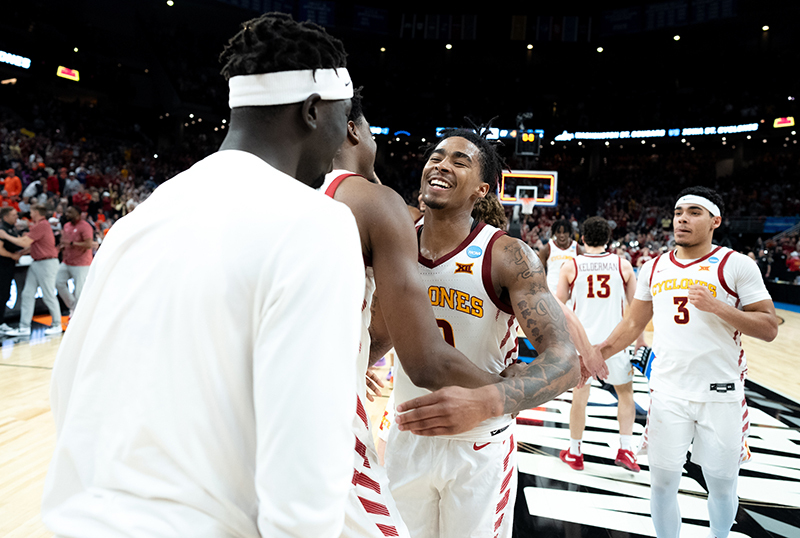
Photo by Jeff Spaur.
Members of the Cyclone men's basketball team celebrate at midcourt March 23 after defeating Washington State in Omaha to advance to the round of 16 teams in the NCAA national men's basketball tournament. It's the program's second Sweet 16 achievement in the past three seasons, seventh in school history. Next up for coach TJ Otzelberger's team is a Thursday night game in Boston against Big 10 tournament champion University of Illinois. The contest tips off at 9:10 p.m. (central time) and will be televised on TBS.
The Cyclone wrestling team capped an outstanding season with a fourth-place finish March 23 in the NCAA national wrestling tournament in Kansas City. Senior David Carr completed his college career with a national championship at 165 lbs, his second national title. His path to the title included wins over the No. 1, 2 and 5-seeded wrestlers. Three other Cyclone wrestlers, Evan Frost (133 lbs, 6th place), Anthony Echemendia (141 lbs, 5th place) and Casey Swiderski (149 lbs, 7th place) made it to the awards podium and earned All-American status.
And on March 24, in the second round of the NCAA women's basketball tournament, the Cyclones took the nation's fourth-ranked team, Stanford University, to overtime before losing a heartbreaker and its chance to advance to the women's Sweet 16.
